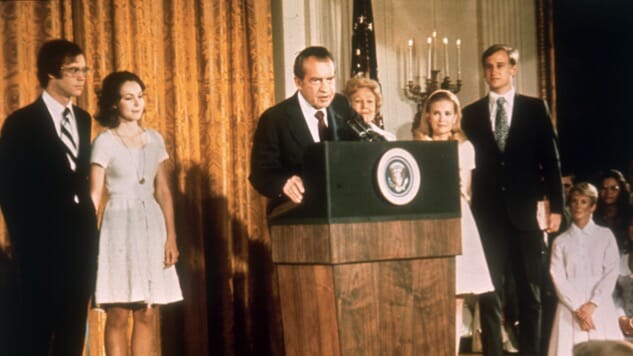Trump’s Nixon Impersonation is Embarrassing
Photo by Keystone
“The press is the enemy.”
Those words were spoken by President Richard Nixon on December 14, 1972, to his national security adviser Henry Kissinger, and were emblematic of his ongoing war with the Fourth Estate. This showdown, which would see the first resignation by an American president, was a battle fought in the headlines, over press conferences, and in extensive investigations that would bring to light one of the most damning scandals in the country’s history.
When President Donald Trump tweeted this Saturday “The FAKE NEWS media (failing @nytimes, @NBCNews, @ABC, @CBS, @CNN) is not my enemy, it is the enemy of the American people!” it was met with near-universal scorn and condemnation, some going as far as to say it signaled Trump’s dictatorial leanings, others noting it was the kind of statement the 37th President might have uttered when only the secret tapes in the walls were listening.
The comparisons between the two have mounted in the first weeks of Trump’s presidency. Critiques trend toward a sense of inevitability that this president is destined to collapse in ruin and disgrace, that Trump’s multitude of lies and scandals will eventually catch up to him, possibly much, much faster than Nixon’s demons caught up with him. The similarities run much deeper than their public behavior and instead lie in the motivating factors that made them and their administrations bodies fraught with deep anxieties, not to mention a dangerous paranoia that finds them surrounded by enemies real and imagined.
Born of Poverty and Privilege
For such similar men, Nixon and Trump could not have had more disparate beginnings. Richard Nixon was born to a poor family in California on a failing lemon ranch and had to scramble his entire life to make ends meet while fighting and clawing to climb the ladder of influence. The son of a real estate developer, Donald Trump grew up in privilege in Queens before being gifted a million dollars-some have claimed that “small loan” amounted to $14 million-by his father to expand the family’s business.
However dissimilar their backgrounds, both have been motivated by entrenched insecurities rooted in their outsider statuses: Nixon in his impoverishment and lack of an Ivy League pedigree and Trump in his long-chronicled desire to be accepted by high-society in Manhattan. Both men’s ascensions were feats of will, the result of lifelong obsessions with sticking it in the eye of those who would underestimate them.
Fear of being ostracized spurred them forward, but also instilled in them a necessity to reject any reality that didn’t suit their needs. Both believed the political world was run via cooperation between dynastic families and the fawning press, a silent deal in which they were on the outside looking in. Both rejected negative polls and disagreeable information as fabricated distortions and proof of their enemies nipping at their heels. Both clutched for dear life to their perceived status as victims as they victimized the rest of the world.
The Law And Order President
When Donald Trump’s Republican National Convention speech leaked the afternoon of his address, it didn’t take long for those reading to realize it amounted to the most pessimistic, dark acceptance speech in modern history. The nation Trump planned to portray that night was an apocalyptic wasteland bereft of decency, an America beset by murder and chaos.
“In this race for the White House,” he’d say later, as supporters outside the convention showered him with Nazi salutes, “I am the Law and Order candidate.”
-

-

-

-

-

-

-

-

-

-

-

-

-

-

-

-

-

-

-

-

-

-

-

-

-

-

-

-

-

-

-

-

-

-

-

-

-

-

-

-








































